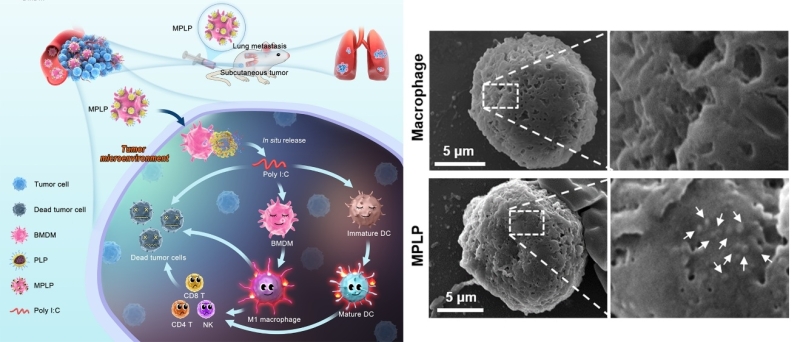Living Macrophage Drug Promotes Antitumor Immunotherapy
Date:18-01-2021 | 【Print】 【close】
Immunotherapy is one of the most promising approaches to inhibit tumor growth and metastasis by activating host immune functions. However, so far, immunotherapy still exhibits limitations of efficacy and safety, such as huge individual differences in treatment responses, difficult to work on solid tumors, systemic immune storm and other immunotoxicity. Therefore, the development of advanced strategies to activate in situ tumor-specific immune response for the anticancer immunotherapy is highly desirable.
A research team led by Prof. CAI Lintao at the Shenzhen Institute of Advanced Technology (SIAT) of the Chinese Academy of Sciences developed a "cytopharmaceutical" based on living macrophages.
The study was published in Biomaterials, Jan. 7.
As important immune cells, macrophages (account for a large proportion of tumor mass) can not only directly kill tumor cells, but also present antigens to effector cells as antigen-presenting cells. What’s more, recent research found that macrophages can also form antigen-specific immune memory, which allowed the body to trigger a stronger immune response when specific antigen appear again.
In the previous studies, macrophages were usually used as drug carriers and did not effectively exert their anti-tumor immunity after entering the tumor microenvironment. Therefore, it will be a promising tumor treatment strategy of using natural living macrophages as drug carriers and maintaining the anti-tumor immunity of macrophages.
In this study, CAI’s group constructed Poly I: C-encapsulated poly (lactic-co-glycolic acid) nanoparticles (PLP NPs) with a slow release profile. A biomimetic system (MPLP), which loaded PLP NPs on the surface of bone marrow-derived macrophage (BMDM) via the maleimide-thiol conjugation, was synthesized to effectively deliver PLP, control drug release and activate the tumor-specific immune response in situ.
"PLP NPs loading does not affect the activity and function of BMDM. BMDM acts as a living cell drug vehicle and promotes the accumulation of PLP NPs in tumors, where Poly I: C is released from PLP NPs and reprograms BMDM into tumoricidal M1 macrophage," said Prof. CAI, "MPLP triggers potent antitumor immune responses in vivo and effectively inhibits local and metastatic tumors without causing adverse pathological immune reactions."
Therefore, this study offers an inspiration to facilitate clinical translation through the delivery of drugs by living immune cells for future anticancer therapy.

Figure. Schematic depiction of PLP NPs loaded on BMDM surface (MPLP) (Image by SIAT)